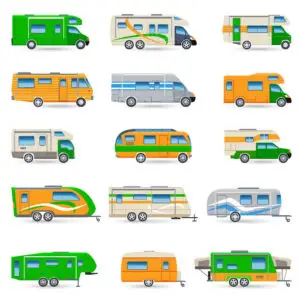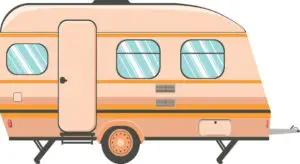Table of Contents
Recreational Vehicles, popularly referred to as RVs, are essentially homes on wheels that provide the luxury of traveling while enjoying the comfort of a home.
The vehicles are designed with an intention to offer travelers a comfortable and convenient way of exploring the world without having to sacrifice their daily comforts.
Over the years, RVing has become increasingly popular as a lifestyle choice among many Americans.
They want to experience traveling and adventure without having to stay in hotels or vacation rentals.
RVs come in different sizes and shapes – some are motorized, others towable – and they can be equipped with various features such as bathrooms, kitchens, bedrooms, entertainment systems, etc.
To power these conveniences, RVs can obtain electricity from several sources:
- Generators
- Solar Panels
- Vehicle Engine
- Shore Power (plugging your RV into an AC electrical grid)
- Portable power stations for RV
Types of RV Power
The flexibility that comes with owning an RV is unparalleled.
With an RV you can decide where you want to go, when you want to go there, how long you want your trip to last, and who you want to bring along for the adventure.
The Importance Of Knowing Different Types Of RVs
Knowing about different types of recreational vehicles is essential for anyone interested in buying or renting one.
When it comes time for purchasing or renting an RV, it is easy to become overwhelmed by all the different options available.
Understanding specific brands’ strengths, weaknesses and available options will help you make the best choice.
Additionally, depending on your needs – whether it’s sleeping space or kitchen appliances – certain models may suit you better than others.
Moreover, every type of recreational vehicle has unique advantages and disadvantages depending on its size class (motorized or towable), amenities included (such as washers/dryers), storage capacity (for food & other necessities), among others.
Understanding these differences will help you choose the best RV for your lifestyle, budget and needs.
Motorized RVs
Motorized RVs are recreational vehicles that have their own built-in engine and drivetrain.
This allows them to be driven on the road without needing a separate towing vehicle.
There are three main types of motorized RVs: Class A, Class B, and Class C.
Class A Motorhomes: Comfortable Living on the Move
Class A Motorhomes are often referred to as luxury coaches because they offer spacious living areas with all the amenities of home.
These RVs can range from 26 feet to over 45 feet in length, with some models featuring multiple slide-outs for even more interior space.
They typically have large kitchens, comfortable sleeping areas, and full bathrooms with toilets and showers.
One of the biggest advantages of Class A Motorhomes is their level of comfort while traveling.
Passengers can easily move around while driving and have access to all the conveniences they need for long trips.
However, this luxury comes at a price – both financially and in terms of fuel efficiency.

different types of RVs
Class B Motorhomes: Compact but Versatile
Class B motorhomes, also known as camper vans or conversion vans, are smaller than Class A motorhomes and typically built on a van chassis.
They range from 16 feet to 22 feet in length and provide an efficient use of space inside.
The interior may feature a small kitchenette, convertible dining/sleeping area(s), and even a bathroom/shower combo if designed correctly.
One key benefit of Class B motorhomes is that they offer more versatility when it comes to parking or navigating through small spaces since they’re closer in size to an average car than other classes of RVs.
Additionally, they’re often much easier on your wallet – both upfront and in terms of gas mileage.
However, with the limited space comes a sacrifice in amenities.
They are not as luxurious as their Class A counterparts and can feel a bit cramped during long trips.
Class C Motorhomes: The Best of Both Worlds
Class C motorhomes are designed on a truck or van chassis with an attached cab section that overhangs the driving area.
This definitely gives them a distinct look.
They range from 20 feet to 30 feet in length and often feature multiple slide-outs for extra interior space.
Class C’s have many similarities to Class A RVs, but tend to be priced more affordably.
One major advantage of Class C motorhomes is their versatility in terms of floor plans and living spaces.
They typically have more sleeping options than Class B’s. Some options include an overhead bed above the cab, kitchen amenities similar to what you’d find in a smaller house, and even separate dining/living areas if you choose the right model.
On the downside, due to their size, they’re harder to maneuver than Class B’s but easier than Class A’s – finding parking spots for them can sometimes be difficult depending on where you plan on traveling.

towable RV
Towable RVs
Towable RVs are a popular option for many travelers because they can be towed behind a vehicle and easily parked when not in use.
There are three main types of towable RVs: travel trailers, fifth wheel trailers, and pop-up campers.
Travel Trailers
Travel trailers come in a range of sizes, from small teardrop trailers to large fifth wheel models.
They offer many amenities of home, such as kitchens, bathrooms, and living spaces.
Travel trailers can be towed by most vehicles with a hitch and are generally less expensive than motorized RVs.
The features of travel trailers vary widely depending on the size and model.
Many modern travel trailers have slide-outs that expand the living space when parked.
Some even have outdoor kitchens or entertainment centers.
However, larger models may require special considerations for towing and parking.
Pros of travel trailers include flexibility in choosing the towing vehicle, lower initial cost compared to motorized RVs, and a range of amenities similar to those found in larger motorhomes.
However, they do have some cons to consider including less living space as compared to larger motorhomes, limited storage for water tanks and propane tanks making it necessary to fill up more frequently on long trips.
Fifth Wheel Trailers
Fifth wheel trailers are similar to travel trailers but have a distinctive design that provides additional living space by extending over the bed of a pickup truck.
This design makes them like two-level apartments on wheels with at least one sleeping area usually located in an elevated section above the hitch which is accessed by stairs inside the trailer.
Fifth wheel models tend to be more spacious than traditional travel trailer models but require heavier-duty trucks with their own fifth wheel hitch installed which is mounted directly into the truck bed.
Features of fifth wheel trailers can include multiple slide-outs, full kitchens and bathrooms with toilets and showers, and even fireplaces or large-screen TVs.
One of the biggest benefits of a fifth wheel trailer is that the truck bed provides additional storage space for extra gear.
Many RVers find that this additional space is worth the investment in a larger truck and fifth wheel trailer.
Pros of fifth wheel trailers include more spacious living areas, improved stability due to connection point being located over rear axel of towing vehicle, and more storage capacity for gear.
The cons to consider when choosing a fifth wheel trailer include higher initial costs as compared to travel trailers because they require a specialized hitch installed onto your truck bed in order to tow them.
Another con is the overall height making it difficult or impossible for some people to maneuver into certain campsites or under low clearance bridges.
Pop Up Campers (also known as Tent Trailers)
Pop up campers are lightweight and foldable trailers.
They offer a basic camping experience with many amenities similar to tent camping but with added comfort features like beds, kitchenettes, and sometimes air conditioning units.
They are typically towed by smaller vehicles like SUVs or minivans, but do not have as much living space as travel trailers or motorized RVs.
The features of pop-up campers typically include fold-down beds on either end that provide sleeping accommodations for four adults along with small galley kitchens which may be equipped with small refrigerators and stoves.
Some models also have slide-out dinette areas for dining inside while others have an attached outdoor dining canopies.
The pros of pop-up campers include their portability coupled with comfort features. Some have beds which can be folded down from poles on each end when parked.
Pop up campers generally have a more affordable price tag compared to other RV options.
This makes them popular among budget-conscious travelers.
Cons include limited living space, less privacy as compared to larger RVs, and being more susceptible to weather changes due to their canvas walls instead of rigid walls that come with other RV types.

No matter your travel style or budget, there is an RV type out there that can fit your needs.
Towable RVs offer flexibility in choosing a towing vehicle and range from more basic pop-up campers to larger fifth wheel trailers with all the luxuries of home.
Each type has its pros and cons, so it’s important to consider your needs when choosing the right RV for you.
Specialty RVs
Truck Campers: The Ultimate in Mobility
Truck campers are the perfect solution for those who want to combine the convenience of a pickup truck with the comfort of an RV.
They are lightweight and small enough to fit on the back of a standard pickup truck, making them incredibly portable.
They typically range in size from 8 to 20 feet in length, with a sleeping capacity of up to four people depending on the model.
One great benefit of owning a truck camper is that it allows you to go virtually anywhere your truck can go.
That includes off-road destinations that might be out of reach for larger motorhomes or towable trailers.
You also have the added bonus of being able to detach your camper from your truck and use it as a standalone RV.
You can do this when you want to explore without having to drive around with all your gear.
The downside is that they can be cramped quarters compared to bigger RVs; they also tend not have many amenities like kitchens or bathrooms.
Sport Utility RVs (Toy Haulers): The Ultimate in Versatility
Sport utility RVs, commonly referred to as “Toy Haulers”, are designed for adventure seekers who don’t want to leave their outdoor toys behind when they hit the road.
These unique vehicles feature a garage area at the back that can be used as storage space or converted into living quarters when needed.
This makes them ideal for families who love off-roading, dirt biking, or any other outdoor activity that requires specialized equipment.
One big advantage of toy haulers is their versatility: after unloading gear and toys from the garage area, you can convert it into living space by using foldable beds and
tables stored away on walls which serve two purposes – as decor and storage when not needed during trips but ready-to-use whenever necessary!
This makes toy haulers a great option for families with kids who want to have space to play games or watch TV while on the road.
However, keep in mind that toy haulers can be heavy and difficult to maneuver, requiring a larger truck or SUV to tow them safely.

Hitting the open road is all about enjoying life’s journey and making unforgettable memories along the way!
Summary of Different Types of RVs
There are numerous types of RVs on the market, each with its own unique features and benefits.
Motorized RVs include Class A, B, and C motorhomes, each with varying lengths and amenities.
Towable RVs consist of travel trailers, fifth wheel trailers, and pop-up campers (also known as tent trailers), which attach to the back of a vehicle.
Specialty RVs include truck campers and sport utility RVs (toy haulers), which have specific uses.
Class A motorhomes are the largest type of motorized RV available.
These luxurious vehicles offer a wide range of amenities such as slide-outs, multiple sleeping areas, full-size kitchens and bathrooms.
They’re typically more expensive than other motorized options but offer plenty of space for larger families or those who prefer more room while traveling.
Class B motorhomes are smaller in size than Class A’s but still provide ample space for a comfortable trip.
They often come equipped with basic amenities like a kitchenette and bathroom facilities but don’t have as much storage or sleeping capacity as larger models.
Class C motorhomes fall somewhere in between Class A’s and B’s in terms of size and price point.
They’re usually built on truck chassis with an attached cab section over the driver’s area.
They offer more living areas than Class B’s but don’t have as many amenities or luxuries as Class A’s.
Travel trailers range from small teardrop designs to large fifth wheels that can sleep up to eight people comfortably.
These towable options offer flexibility when it comes to vehicle choice; almost any SUV or pickup truck can tow one depending on their weight capacity.
Fifth wheel trailers have two levels: one above the truck bed where the hitch is installed called “the gooseneck” section and one below the hitch area called “the fifth wheel.”
They offer a more stable towing experience than traditional travel trailers.
Pop-up campers (or tent trailers) are the perfect option for those who want a more rustic camping experience with the added benefit of having shelter.
They can sleep up to six people comfortably and are easy to set up and take down.
Truck campers are designed to fit on pickup trucks and offer a compact living space with basic amenities like sleeping quarters, a kitchenette, and sometimes a bathroom.
Toy hauler RVs come in both motorized and towable options.
They’re built to transport ATVs, motorcycles, golf carts or other recreational vehicles while still providing living arrangements for travelers.

Final Thoughts
When it comes to choosing an RV that fits your lifestyle needs, there’s something available for everyone.
Knowing the different types of RVs helps in deciding what will work best for you.
Whether you’re traveling solo or with family members/friends there’s an RV out there that offers comfortability in every aspect such as size, amenities, cost, etc.
Regardless of what type of RV you choose just remember that hitting the open road is all about enjoying life’s journey and making unforgettable memories along the way!
